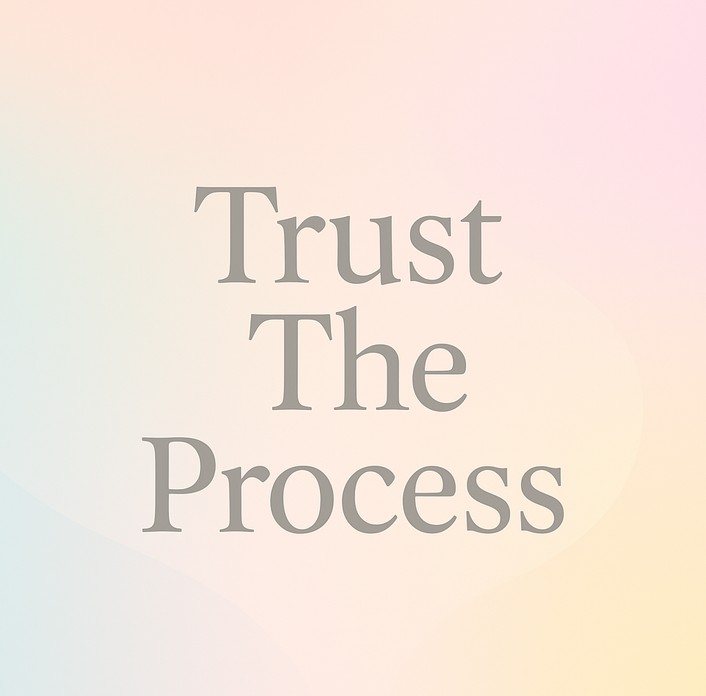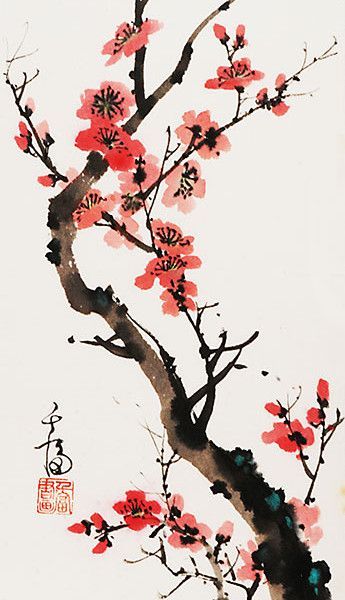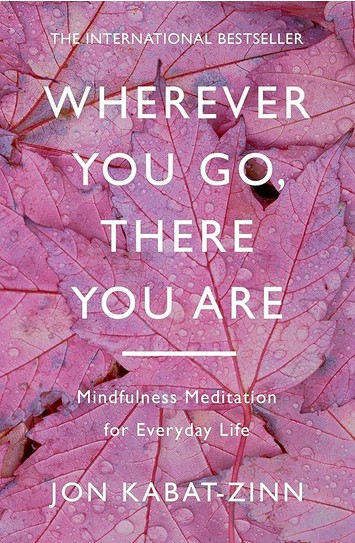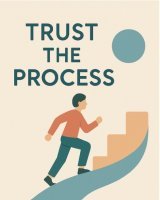How To Trust The Process Mindfully - Right Now

How To Trust The Process Mindfully
When we talk about how to trust the process mindfully, we are talking about the fundamental mindset that will help you to trust a recommended process that you are committing to following.
In this short article we are going to apply this mindset to the process of practicing mindfulness.
# The Process = This Present Moment
In mindfulness, the process isn’t some distant goal — it's what is happening right now.
- Breathing in, breathing out.
- Noticing a thought arise.
- Feeling tension in the body.
- Hearing a sound.
# Non-Striving
Mindfulness teaches us that trying to achieve a state — peace, stillness, enlightenment — often gets in the way.
Jon Kabat-Zinn calls this non-striving:
Trusting the process means letting go of the desire to "fix" or "improve" every moment, and instead resting in the unfolding.
# Impermanence and Change
Everything shifts: emotions, sensations, thoughts, moods.
- Pain arises
- Pain passes
- Joy arises
- Joy passes.
# Patience and Faith
In mindfulness practice, sometimes you feel nothing is happening. Or you may feel frustration, boredom, even failure.
Trusting the process means having faith that simply sitting, breathing, noticing - over time - leads to transformation, even if the change is subtle and slow.
As Thich Nhat Hanh might say:
“We don’t need to chase after anything. Everything we need is already here, in this moment.”
In summary:
Mindful Practice, Teaching and Metaphor

Here is a:
- Simple practice to help cultivate this
- Zen teaching on trusting the process
- Metaphor to deepen the understanding.
# Simple Practice: "Letting Be" Meditation

You can do this in just 5–10 minutes.
- Sit comfortably. Feel your body supported by the earth.
- Bring attention to your breath. No need to control it. Just feel it.
- As thoughts, emotions, or body sensations arise, silently say to yourself: “Let it be.”
- You don’t need to analyze, judge, or fix anything. Allow the experience to come and go naturally.
- If you
feel tension or restlessness, acknowledge it gently:
“This too is part of the process.” - Keep returning to breath and presence, with an attitude of patience.
Zen Teaching: The Farmer's Luck

This is an old Zen parable you may have heard,
but it beautifully embodies trusting the process:
- There was once a farmer. One day, his horse
ran away. His neighbor said: “Such bad luck!”
The farmer replied: “Maybe yes, maybe no.” - The next day, the horse returned, bringing
three wild horses with it.
The neighbor said: “Such good luck!”
The farmer replied: “Maybe yes, maybe no.” - Later, the farmer's son tried to ride one of
the wild horses, fell, and broke his leg.
The neighbor said, “Such bad luck!”
The farmer replied, “Maybe yes, maybe no.” - Soon after, soldiers came to the village to
recruit young men for war. Because of his broken leg, the son was spared.
The neighbor said, “Such good luck!”
The farmer replied, “Maybe yes, maybe no.”
Lesson of "The Farmer's Luck":
Metaphor: The Bamboo and the Oak

Imagine two trees in a storm: the strong oak
and the supple bamboo.
- The oak resists, trying to hold firm against the wind. Eventually, its rigid trunk may snap.
- The bamboo bends with the wind, sways, and returns to upright when the storm passes.
All together, these point toward one deep truth in mindfulness:
Mindful Reminder, Reading and Koan

Here is a:
- Daily reminder phrase you can carry
- Deeper reading suggestion
- Short koan practice for contemplation.
A Daily Reminder Phrase

A simple phrase you can silently repeat throughout your day, especially when facing frustration or uncertainty:
“I trust this moment to unfold as it must. I release control, and I am here.”
You can say it when:
- you feel impatient
- you're caught in worry
- you're facing unexpected change
- or even when you're simply breathing.
These quiet reminders gently train the mind to return to trust.
A Deeper Reading Suggestion

"Wherever You Go, There You Are" — Jon Kabat-Zinn
This is one of the most accessible and profound introductions to mindfulness.
Many chapters touch on trusting the process — especially his teachings on non-doing, patience, and letting be.
Short quote from the book:
“You can’t make a flower grow by pulling on it. You can only give it the conditions to grow and let nature take its course.”
This is exactly the heart of trusting the process.
A Short Koan Practice

Koans are short Zen sayings or stories meant to help loosen our attachment to logical mind and invite insight.
Here’s a simple one:
"Sitting quietly, doing nothing,
Spring comes, and the grass grows by itself."
How to practice with it:
- Sit quietly for a few minutes.
- Gently repeat the koan in your mind.
- Let the words sink in.
- Don't analyze — simply feel the meaning in your body.
- Notice any feelings of relaxation, surrender, or trust that arise.
Over time, this koan can open up layers of insight into what it means to allow life to unfold.
Return from: "How To Trust The Process Mindfully" to: Walking The Talk
Or to: How To Practise Mindfulness
Next Article:
How To Live With Contradiction - Beyond Thought Let Stillness Speak
LATEST ARTICLES
Trust The Process - Beyond The Cliche
 The phrase "trust the process" has become a cliche, the woo-woo mantra of the "self help" industry. Those three little words feel like they ought to mean something useful but hidden behind them are a…
The phrase "trust the process" has become a cliche, the woo-woo mantra of the "self help" industry. Those three little words feel like they ought to mean something useful but hidden behind them are a…The Dopamine Delusion - Why Anticipation Beats Achievement
 The thrill we feel is not in the having, but in the wanting. The more we have, the more we want. The more things we acquire and the easier things get for us, the more discontent we feel. The more spo…
The thrill we feel is not in the having, but in the wanting. The more we have, the more we want. The more things we acquire and the easier things get for us, the more discontent we feel. The more spo…The Power Of Silence Is Experienced In Your Use Of Language
 Practise the "Beneficial Neurological Delay" for optimal comprehension. The power of silence is experienced in your use of language, specifically: - How you formulate the words you use to think and in…
Practise the "Beneficial Neurological Delay" for optimal comprehension. The power of silence is experienced in your use of language, specifically: - How you formulate the words you use to think and in…Dealing With Setbacks - 5 Questions To Help You Face Discomfort
 How To Counter The Cognitive Shock Of A Setback. Setbacks challenge your instinctual desire for control and comfort, making it unnatural to respond with calm or acceptance. The reason for these instin…
How To Counter The Cognitive Shock Of A Setback. Setbacks challenge your instinctual desire for control and comfort, making it unnatural to respond with calm or acceptance. The reason for these instin…Why Praxis Is The Key To Living A Successful And Stress Free Life
 Praxis Is The Process Of Taking Informed Action To take informed action you need to be prepared with information, knowledge, education and insight. Informed action is objective action that: - Seeks to…
Praxis Is The Process Of Taking Informed Action To take informed action you need to be prepared with information, knowledge, education and insight. Informed action is objective action that: - Seeks to…The Power Of Working With The Front Line
 How To Exercise Influence Without Authority In Complex Systems I first discovered the power of working with the frontline when I was working as a business troubleshooter on large projects, programmes…
How To Exercise Influence Without Authority In Complex Systems I first discovered the power of working with the frontline when I was working as a business troubleshooter on large projects, programmes…Dealing With Distraction - Learning How To Live With Your "Attention Autopilot"
 Living With Your Attention Autopilot The good news about your Attention Autopilot is that it will keep you safe. It is continuously scanning your immediate environment for threats. The bad news is tha…
Living With Your Attention Autopilot The good news about your Attention Autopilot is that it will keep you safe. It is continuously scanning your immediate environment for threats. The bad news is tha…The Time Of Your Life - Recognising Moments Of Alignment For Action
 How will you recognise your moment of alignment for action? In this article I want to look at our relationship with time and in the context of the two main themes of this site, firstly as a thinking s…
How will you recognise your moment of alignment for action? In this article I want to look at our relationship with time and in the context of the two main themes of this site, firstly as a thinking s…The Metagame Approach to Second Order Thinking - 5 Guiding Principles
 How To Position Yourself For Survival & Success In A Complex Environment We treat life as though it is a complicated system, and our thinking skills and mental models are focused on understanding its…
How To Position Yourself For Survival & Success In A Complex Environment We treat life as though it is a complicated system, and our thinking skills and mental models are focused on understanding its…Outcome Over Optics - Long Game Outcomes Over Short-Term Ego Gains
 The Day I Learned To Focus On Outcome Over Optics I have never forgotten the day I learned to focus on outcomes over optics and figured out a very simple way of saving myself several hundred thousand…
The Day I Learned To Focus On Outcome Over Optics I have never forgotten the day I learned to focus on outcomes over optics and figured out a very simple way of saving myself several hundred thousand…The ETTO Principle - Why Near Enough Can Be Good Enough
 How To Balance the Efficiency-Thoroughness Trade Off The ETTO Principle describes the inherent trade-off between working efficiently and working thoroughly. This trade-off is something that affects…
How To Balance the Efficiency-Thoroughness Trade Off The ETTO Principle describes the inherent trade-off between working efficiently and working thoroughly. This trade-off is something that affects…Master The Art Of Drawing The Bow
 Focus On Process Not Outcome In so many areas of our lives, we focus on the outcome, not the process that we follow to achieve it. In the western world, we are conditioned to pay less attention to how…
Focus On Process Not Outcome In so many areas of our lives, we focus on the outcome, not the process that we follow to achieve it. In the western world, we are conditioned to pay less attention to how…And So This Is Christmas
 There Is No Path To Peace - The Path Is Peace Thich Nhat Hanh, the renowned Vietnamese Zen Buddhist monk, teacher, and peace activist, often spoke about peace as a state of being that begins within on…
There Is No Path To Peace - The Path Is Peace Thich Nhat Hanh, the renowned Vietnamese Zen Buddhist monk, teacher, and peace activist, often spoke about peace as a state of being that begins within on…Curiosity Skilled The Cat - Optimize For Interesting
 Curiosity Fuels Excellence The old adage, “Curiosity killed the cat,” warns of the dangers of venturing too far into the unknown. But what if we reimagine it not as a risk but as a gateway to developi…
Curiosity Fuels Excellence The old adage, “Curiosity killed the cat,” warns of the dangers of venturing too far into the unknown. But what if we reimagine it not as a risk but as a gateway to developi…Let Stillness Speak - Living Within A Complex System
 To let stlllness speak is to learn it's first major lesson: you are not your thoughts. To let stillness speak is about stepping back from the constant chatter of your mind and allowing a deeper, quiet…
To let stlllness speak is to learn it's first major lesson: you are not your thoughts. To let stillness speak is about stepping back from the constant chatter of your mind and allowing a deeper, quiet…Understanding Complex Systems Thinking - It's Not Complicated
 Understanding, and being able to work with, complexity is an important thinking skill.
We are all working with complex systems, and we do so every day. The biggest one is life itself. We automaticall…
Understanding, and being able to work with, complexity is an important thinking skill.
We are all working with complex systems, and we do so every day. The biggest one is life itself. We automaticall…Stay On The Bus - When To Keep On Going
 The Helsinki Bus Station Theory
Have you ever started a new project, initiative or role with a big vision and a determination to make a difference? Initially you were full of enthusiasm and highly mo…
The Helsinki Bus Station Theory
Have you ever started a new project, initiative or role with a big vision and a determination to make a difference? Initially you were full of enthusiasm and highly mo…Zen Thoughts Email Series
 Conversations With A Friend Zen Thoughts is an email series of 50 short messages spread over 3 months. The messages are written in the style of a conversation with a friend who is going through a toug…
Conversations With A Friend Zen Thoughts is an email series of 50 short messages spread over 3 months. The messages are written in the style of a conversation with a friend who is going through a toug…How to Get What You Value by Changing What You Measure
 Give Up Control & Gain Influence To Get What You Want
The metrics we choose to focus on can significantly shape our outcomes, sometimes in ways we don't intend. The challenge is to make sure that you…
Give Up Control & Gain Influence To Get What You Want
The metrics we choose to focus on can significantly shape our outcomes, sometimes in ways we don't intend. The challenge is to make sure that you…How to Become A Master At Overcoming Hard Moments
 "The best in the world are not the best because they win every point. It's because they lose again and again and have learned how to deal with it." This quote from Roger Federer has got a lot of cover…
"The best in the world are not the best because they win every point. It's because they lose again and again and have learned how to deal with it." This quote from Roger Federer has got a lot of cover…